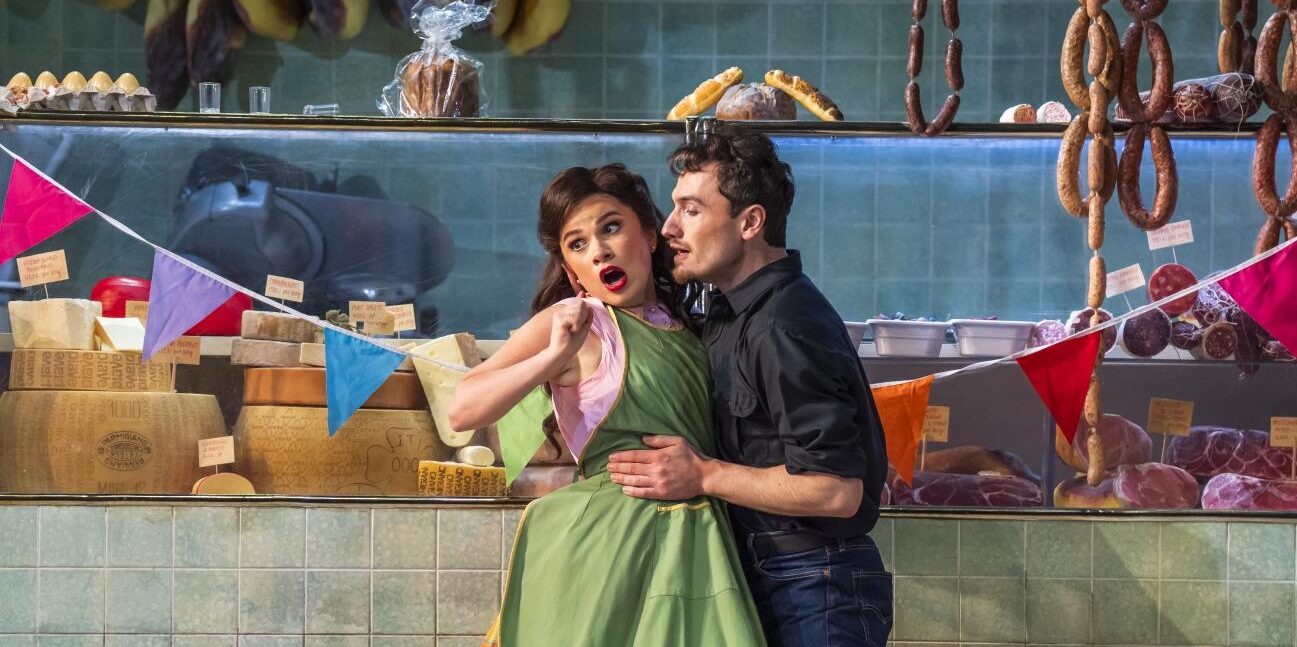Il Turco in Italia may not be one of Rossini’s most famous works from his prolific period between 1810 and 1830, but Glyndebourne Opera’s lively production makes a strong case for its place among his top works. This comic opera, which predates The Barber of Seville, offers unique elements that are brought into sharp relief by Mariame Clément’s inventive direction for Glyndebourne. Rossini was likely inspired by Mozart’s Cosi fan tutte, which was being performed in Milan while he composed Il Turco. The parallels between Mozart’s Don Alfonso and Rossini’s Prosdocimo add an interesting layer to the opera’s themes.
Prosdocimo, portrayed by Ross Ramgobin, is a poet with writer’s block who roams Naples in search of inspiration. He encounters a diverse set of characters: Zaida, a gypsy and former love of Prince Selim; Fiorilla, the dissatisfied wife of Geronio, an older shopkeeper; and Narciso, Geronio’s employee, who harbours a not-so-secret infatuation with Fiorilla. When Selim arrives in Naples, a cascade of farcical events unfolds—masked balls, mistaken identities, and disguises—leading to a finale where the Turk must choose between his lost love, Zaida, and the spirited Fiorilla. While the story concludes with a typical opera buffa happy ending, it leaves viewers questioning whether the joy will endure beyond the curtain’s fall.
The cast delivers outstanding performances, with Inna Demenkova shining as the flirtatious Fiorilla. She exudes perfect comic timing and navigates her challenging arias with ease. Michael Mofidian is equally captivating as Selim, balancing charm with a rich, powerful voice. Grace Durham brings depth to Zaida’s character, and Fabio Capitanucci as the cuckolded Geronio uses his resonant baritone to infuse his character’s plight with genuine pathos, elevating him beyond a mere figure of ridicule.
Mariame Clément adds an inventive twist by casting Prosdocimo as a writer who is frequently interrupted by characters seeking larger roles or better outcomes. His girlfriend, a non-singing part deftly played by Anna Marie Sullivan, assists with his writing and occasionally redirects the story’s course, even siding with female characters to challenge Prosdocimo’s more questionable intentions. In Act I, costume and set changes reflect the evolving storyline, while Act II opens in a set 1950s-style delicatessen, giving the plot a settled, nostalgic charm. This framing device proves effective, encouraging the audience to engage with the subtleties of the plot, rather than merely enjoying the laughs.
Conductor Olivia Clarke, a rising star with a distinguished background that includes the International Conducting Academy in Berlin, expertly handles Rossini’s demands on singers and brings out the best in the Glyndebourne Sinfonia. The Glyndebourne chorus, particularly the male voices, performs admirably, with outstanding ensemble work.
It’s a shame—and a missed opportunity—that such a high-calibre production isn’t more accessible nationwide. The combination of excellent singing, humour, and thought-provoking staging is a testament to Glyndebourne’s artistry. Arts Council England should take note.
Venue: Glyndebourne Opera, Sussex
Composer: Gioachino Rossini
Libretto: Felice Romani
Director: Mariame Clement
Conductor: Olivia Clarke
Performers incl : Grace Durham, Fabio Capitanucci, Inna Demenkova, Michael Mofidian, Ross Ramgobin.
Running time: 3 Hours
Until 30 October, 2024
Photographs: © Glyndebourne Productions Ltd. Photographer:Tristram Kenton

